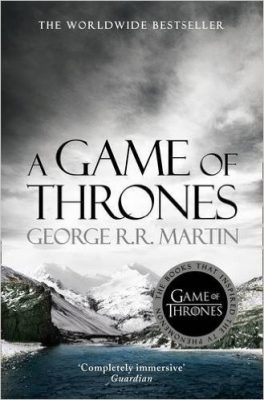
What I think
-
Plot
-
Settings
-
Characters
-
Writing
If you liked this you might like:
The Warlord Trilogy, The Malazan Book of the Fallen, The Wheel of Time, The Lord of the Rings, The Lions of Al Rassan, Tigana, The Riftwar Series
Buy now from Amazon
Just to establish some geeky bona fides – I actually discovered this series in my first year at university in 2000, and I remember staying up late at night to finish reading ‘A Clash of Kings’ when I should have been writing an essay. These books are addictively good. I’m glad of the success of the TV series – it’s an excellent adaptation. In fact, dare I say that it could be one of the rare examples where the adaptation is better than the original work (Jurassic Park also springs to mind in this category)? My reasons are below.
The books are in my experience unique in fantasy novels, with each chapter written around a different character. I do not say ‘from the point of view’ as the narrator is in the third person, but dances a technically difficult and impressive perspective through many characters’ eyes. This is a strength of the book and is a fantastic way of creating suspense. However, without careful editing it also becomes a weakness in the series – I felt that Feast for Crows and Dance with Dragons spent a lot of time narrating peripheral characters, which meant that the main drive of the story is lost. Here is a series which has become tangled in its own narrative thread. Or perhaps this is the point at which The Song of Ice and Fire becomes more literary. We have multiple viewpoints on a world, multiple voices, multiple lives out of which to construct a narrative. Perhaps the point of the story is that it is not a story – in a complex and compelling, brutal and unforgiving world, it is impossible to predict which characters will triumph and survive and which will die. Narratives are just psychological constructs we use to understand events. Perhaps Martin’s narrative is not comprehensible in the end, it is up to us to make sense of the individual lives and construct a narrative of our own.
In the same way, Martin’s moral compass is not so simplistic as in many fantasy works. In Westeros, good and evil are not easy to discern – the world he has created very much rings true to our own, with most characters simply trying to do the best by themselves and the people they care about. It is an individualistic world, where honour is much touted but not often displayed. The plots of the various interests are deep indeed, some of the characters truly Machiavellian.This is a very mature viewpoint, which makes these quite ‘grown up’ books, quite aside from the graphic violence, explicit sex and foul language.
My favourite storylines (and from the TV show I suspect most people’s) are Jon Snow, Tyrion Lannister, and Daenerys Targaryen. My favourite parts of the story are where Martin most closely approaches magic and the mysterious – in the icy wastes north of the Wall, in the strange hinterlands of the deserts in the south. Perhaps that’s just my penchant for the wilderness over the town.
Martin writes description, dialogue and action equally well throughout the books. However, I find many of the characters difficult to get on with, which can make for difficult reading. The characters being unlikeable is part of the point, I suppose – but I can’t help but resent hours reading from the perspective of Cersei whom the author has been at such pains to make so tediously vile. She is more sympathetic in the show than in the books, in my view – where you have access to her thoughts you feel that she is just a dreadful fool, cruel and entitled, with only a thin veneer of cunning that enables her to manoeuvre the politics of court.
Other characters have storylines that at times excite but otherwise plod along. Or whom move from being naive to mature and interesting at glacial pace. This is true to the time passing and the fact that they might spend a lot of time stuck in a situation – but as a reader we don’t really need to see this. Sam and Sansa’s storylines particularly suffer from this in my opinion, and usually you’re glad when their chapters end. Except when a new random peripheral character is introduced! This is where the TV show works better than the books, as the pictures on screen save thousands of words of your time.
So the big advantage of the shows over the novels is pace and narrative drive. But the novels give you rich detail and complexity that keep you going back for more. So even though I’ve seen how the story turned out in the series, I am still eagerly anticipating the final books. I am sure George R.R. Martin has kept some surprises up his sleeve for us.
